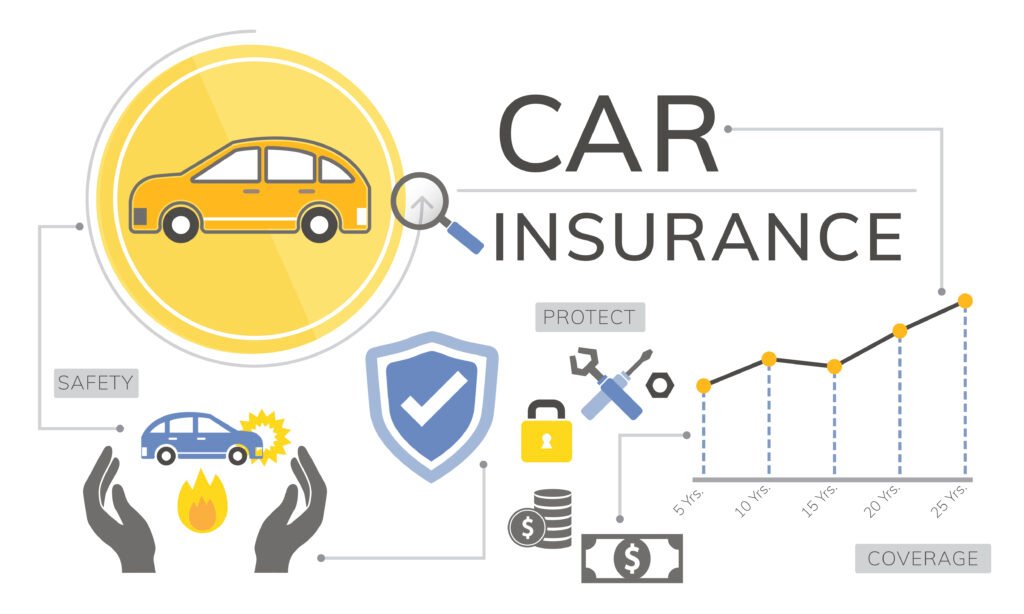Protect Your Car and Your Future
Find the Best Auto Insurance for Your Needs
Explore top insurance providers, compare plans, and find affordable, reliable auto insurance that fits your budget and lifestyle.

Introduction: Understanding Auto Insurance
Choosing the right auto insurance is a crucial decision that protects both you and your vehicle in case of accidents, theft, or natural disasters.
With numerous auto insurance companies available, each offering different benefits, policies, and pricing structures, it’s essential to understand your options before making a commitment.
In this guide, we’ll walk you through the top 10 auto insurance providers, explore large vs. small insurance companies, discuss the pros and cons of each, and provide expert insights on how to find the best auto insurance company for your needs.
Insurance Companies Market Share (in Billions)
Top 10 Auto Insurance Companies 2025

State Farm: Best for Local Agents
- ✓ Market Share: 18.3%
- ✓ Premiums Written: $58.0 billion
- ✓ Rating: ★★★★★

Progressive: Best for Discounts
- ✓ Market Share: 15.3%
- ✓ Premiums Written: $48.3 billion
- ✓ Rating: ★★★★☆

Geico: Best for Affordability
- ✓ Market Share: 12.3%
- ✓ Premiums Written: $38.9 billion
- ✓ Rating: ★★★★☆

Allstate: Best for Extensive Coverage
- ✓ Market Share: 10.4%
- ✓ Premiums Written: $32.8 billion
- ✓ Rating: ★★★★☆

USAA: Best for Military Families
- ✓ Market Share: 6.3%
- ✓ Premiums Written: $19.8 billion
- ✓ Rating: ★★★★★

Liberty Mutual: Best for Customizable Policies
- ✓ Market Share: 4.2%
- ✓ Premiums Written: $13.3 billion
- ✓ Rating: ★★★★☆

Farmers: Best for Local Agent Support
- ✓ Market Share: 4.2%
- ✓ Premiums Written: $13.2 billion
- ✓ Rating: ★★★★☆

American Family: Best for Affordable Rates
- ✓ Market Share: 2.2%
- ✓ Premiums Written: $6.8 billion
- ✓ Rating: ★★★★☆

Travelers: Best for Competitive Rates
- ✓ Market Share: 2.1%
- ✓ Premiums Written: $6.6 billion
- ✓ Rating: ★★★★☆

Nationwide: Best for Excellent Support
- ✓ Market Share: 1.7%
- ✓ Premiums Written: $5.4 billion
- ✓ Rating: ★★★☆☆
Expert Insights to Help You Make Smarter Financial Decisions
Large auto insurance companies often rely on powerful branding, such as Flo from Progressive and Jake from State Farm, to create trust and familiarity, influencing customer perceptions. While these companies offer stability and broad coverage, they often come with higher premiums due to their size.
Smaller companies, on the other hand, may not have the same brand recognition but can offer competitive products with personalized service and potentially lower rates, especially for low-risk drivers.
Market share plays a key role in how customers perceive insurance providers, with larger companies signaling reliability but at a higher cost. Mergers and acquisitions can also impact customer satisfaction, often leading to price increases or changes in service quality.
In today’s digital age, many customers are opting for the convenience of online services, while others still value personalized interactions with local agents. Ultimately, the decision depends on balancing affordability, service quality, and the level of personalization you want from your insurance provider.

How to Find the Right Insurance Company for You
Factors to Consider:
Coverage Needs: Determine the level of coverage you need (liability, collision, comprehensive).
Personalized Service: Consider how much interaction you want with your insurance provider.
Cost: Find a balance between affordable premiums and sufficient coverage.
Customer Reviews: Look for companies with good customer satisfaction ratings and reviews.
Steps to Choose:
Get quotes from multiple providers.
Compare coverage options and discounts.
Read customer feedback and reviews.
Consider your personal situation (vehicle type, driving habits, budget).

Understanding Car Insurance Coverage Options
When selecting an auto insurance policy, it’s important to understand the different types of coverage available. Here are the key coverage types that most car insurance companies offer:
1. Liability Insurance (Bodily Injury and Property Damage)
Liability insurance is essential for protecting yourself if you’re at fault in an accident. It covers the medical expenses and property damage you cause to others. This type of insurance is often required by law in most states. It can also help cover legal fees if you’re sued after an accident. Make sure you have enough liability coverage to avoid financial strain.
2. Collision Coverage
Collision insurance covers damage to your car in the event of a collision with another vehicle or stationary object, regardless of who’s at fault. While it’s not required by law in most states, it is often needed if you finance or lease your car. Collision coverage ensures that you’re not left with the cost of repairs after an accident.
3. Comprehensive Coverage
Comprehensive coverage goes beyond collisions, covering non-collision damages such as theft, vandalism, fire, and even damage caused by weather conditions like hailstorms or falling trees. Though not typically required by law, many lenders and lessors will require you to have comprehensive coverage to protect your vehicle. It’s a wise choice for added peace of mind.
4. Medical Payments (MedPay)
Medical payments coverage (MedPay) helps cover medical costs for you and your passengers after an accident, regardless of who was at fault. This type of coverage can also extend to funeral expenses. MedPay ensures that medical bills are taken care of quickly, without having to wait for a lengthy claims process.
5. Personal Injury Protection (PIP)
Similar to MedPay, Personal Injury Protection (PIP) covers medical expenses for you and your passengers, but it also helps cover other related costs, such as lost wages and rehabilitation. PIP is available in certain states and is designed to expand coverage beyond medical costs, offering broader financial protection in the event of an accident.
6. Additional Coverage Options
Many insurance providers offer optional add-ons to tailor your policy to your needs. These can include:
Rental Car Reimbursement: Covers the cost of a rental car while your vehicle is being repaired.
Roadside Assistance: Provides help if your car breaks down, including services like towing and battery jump-starts.
Rideshare Coverage: Protects you if you’re driving for a rideshare company (like Uber or Lyft).
Gap Insurance: Helps cover the difference between what you owe on your car and what it’s worth if it’s totaled in an accident.
Accident Forgiveness: Prevents your first accident from affecting your insurance rates.
Choose the Right Coverage for Your Needs
Each driver has unique needs, so it’s important to choose the right combination of coverage that fits your situation.
Whether you’re looking for basic protection or comprehensive coverage, understanding these options helps you make the best choice for your car insurance needs.
Be sure to compare quotes, ask about discounts, and understand your state’s minimum requirements before making a decision.

More coverage from the best car insurance companies
| Company | Roadside Assistance | Accident Forgiveness Coverage | Rental Reimbursement Coverage | Umbrella Insurance | Glass Coverage | Gap Coverage | Original Equipment Manufacturer (OEM) Coverage | Pay-per-mile Insurance | Custom Equipment Coverage | Rideshare Insurance | Car Repair Insurance | New Car Replacement |
|---|---|---|---|---|---|---|---|---|---|---|---|---|
| Travelers | ✓ | ✓ | ✓ | ✓ | ✗ | ✓ | ✗ | ✓ | ✗ | ✓ | ✗ | ✓ |
| USAA | ✓ | ✗ | ✓ | ✗ | ✗ | ✓ | ✗ | ✓ | ✗ | ✓ | ✗ | ✗ |
| American National | ✓ | ✗ | ✓ | ✗ | ✗ | ✓ | ✗ | ✗ | ✗ | ✗ | ✗ | ✗ |
| Geico | ✓ | ✗ | ✓ | ✗ | ✗ | ✗ | ✗ | ✗ | ✗ | ✗ | ✓ | ✗ |
| Progressive | ✓ | ✗ | ✓ | ✗ | ✗ | ✗ | ✗ | ✗ | ✓ | ✓ | ✗ | ✗ |
| Nationwide | ✓ | ✓ | ✓ | ✗ | ✗ | ✓ | ✗ | ✓ | ✗ | ✗ | ✗ | ✗ |
| Auto-Owners | ✓ | ✓ | ✓ | ✗ | ✗ | ✓ | ✗ | ✗ | ✗ | ✗ | ✗ | ✗ |
| Farmers | ✓ | ✓ | ✓ | ✓ | ✓ | ✓ | ✓ | ✗ | ✓ | ✓ | ✓ | ✓ |
| Amica | ✓ | ✗ | ✓ | ✓ | ✓ | ✓ | ✗ | ✗ | ✗ | ✓ | ✗ | ✗ |
| The Hartford | ✓ | ✓ | ✓ | ✗ | ✓ | ✓ | ✗ | ✓ | ✗ | ✗ | ✓ | ✓ |
How Does Car Insurance Cost?
On average, the annual premium for car insurance in the U.S. is about $2,012, according to recent studies. However, the actual cost can vary widely depending on the insurance company, your driving history, and the type of coverage you select.
Among the insurers in our study, American National offers the most affordable rates, followed by USAA, Geico, Travelers, and Auto-Owners.
Average Annual Car Insurance Premiums by Provider
Here’s a breakdown of the average annual premiums from some of the leading auto insurance companies:
The Hartford: $2,015
Average Rate: $2,012
Nationwide: $1,981
Progressive: $1,820
Auto-Owners: $1,741
Country Financial: $1,736
Geico: $1,669
Travelers: $1,549
Root: $1,394
USAA: $1,279
American National: $970

Factors That Influence Your Car Insurance Premium
Several key factors determine the cost of your car insurance policy. Insurers use these factors to assess your level of risk and set the premium:
Your Location: Insurance rates may be higher in areas with higher accident rates or theft occurrences.
Driving Record: If you have a clean driving history, you’ll likely pay lower rates, while traffic violations or accidents could drive up costs.
Age and Vehicle Type: Younger drivers or those with high-performance vehicles may pay more for insurance.
Coverage Options: The types of coverage you select, such as collision, comprehensive, and liability, will impact your premiums.
Credit Score: In certain states, insurers may consider your credit score when calculating your insurance rates, as it can be an indicator of risk.

Conclusion: Choose the Best Auto Insurance with Top Providers
Finding the right auto insurance is all about choosing a provider that offers the coverage you need at an affordable price. With trusted names like State Farm, Geico, Progressive, and USAA, you can find a plan that not only fits your budget but also provides reliable protection for your vehicle.
Whether you’re looking for basic liability coverage or full protection, it’s important to compare quotes from leading companies to ensure you’re getting the best deal. State Farm offers great local agents, Geico is known for competitive rates, and Progressive provides numerous discounts. USAA, on the other hand, offers excellent rates for military families.
Start today by comparing the top auto insurance providers. Get a free quote now, and find the auto insurance that meets your needs, giving you peace of mind on the road.